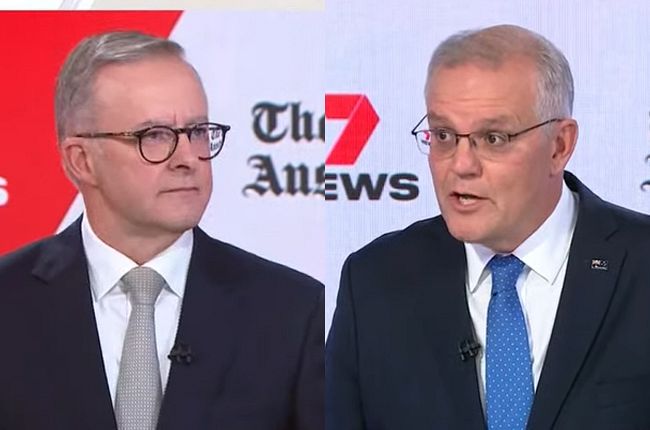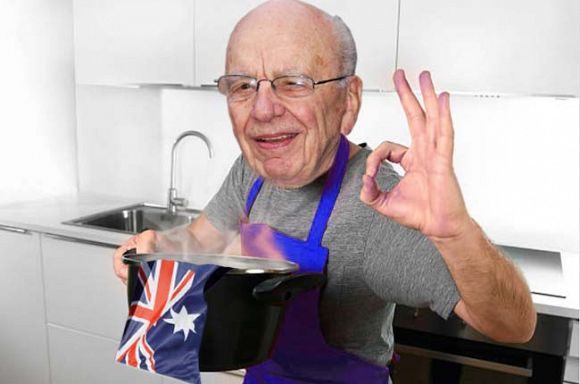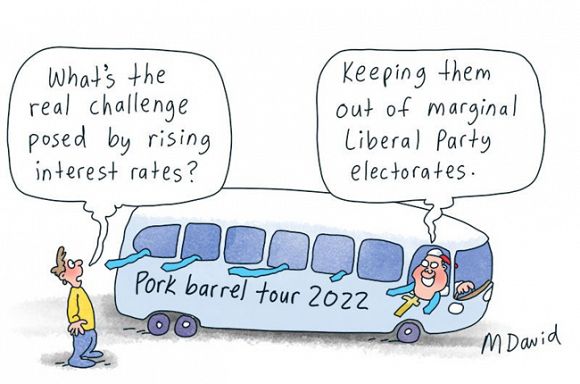The news media’s framing of debates about wage rises reveals subtle yet powerful class bias is alive and well in the mainstream media.
When Labor’s support for wage rises is seen as “controversial”, while Liberals’ opposition to wage rises is viewed as “natural”, it shows that there is no such thing as a view from nowhere in political reporting.
The second to last week of the election campaign was dominated by debates between the major parties about cost-of-living pressures caused by inflation. Labor Leader Anthony Albanese’s support for a rise in the minimum wage in line with inflation and Prime Minister Scott Morrison’s opposition to wage rises reflect the foundational values of their respective parties.
The Labor Party grew from the early years of the trade union movement, representing workers in their collective struggle to improve their working conditions, including wages. The Liberal Party was established to counter the labour movement’s political power. To this day, Liberals still do the political bidding of employers, opposing workers’ collectivism.
This is why it’s hardly surprising that this week Albanese said he supports a rise in the minimum wage of 5.1 per cent to ensure the lowest-paid workers don’t have a real wage cut. Imagine if the leader of the Labor Party didn’t advocate for low paid workers’ wages to keep up with inflation. That would be politically scandalous.
Yet, the bias inherent in media framing of such debates was on show when Albanese’s quite reasonable and economically responsible argument that low wages should keep up with the cost of living was framed as the “controversial” argument.
This framing shows that journalists, probably unconsciously, stand in the shoes of employers by judging a wage rise in line with inflation as “controversial”, while framing Morrison’s opposition to wage rises – his support for wages going backwards – as entirely natural.
For example, David Crowe in the Sydney Morning Herald characterised Albanese’s support for a 5.1 per cent rise in the minimum wage as sparking a political storm. The Australian’s Tom Dusevic echoed Morrison’s “loose” criticism of Albanese in an article titled ‘Albanese's loose rhetoric on wages spooks the horses’, where he framed Albanese’s support for wage rises as ‘an economy killer’.
Even at the apparently politically neutral ABC, Albanese’s support for wage rises was framed by Jane Norman as an ‘unusual step’ and quoted Liberal Senator Simon Birmingham as using ‘Albanese's intervention to again question his economic credentials’.
What is missing from all this analysis of Albanese’s position on wages is any mention of the reason Australians are experiencing cost of living pressures thanks to sky-high inflation: prices.
In all three of these examples, the word “prices” was not even mentioned. There are in fact two economic factors that can cause inflation: rising prices and rising wages. Since we know wage growth is historically low, the current cause of inflation in Australia is rising prices.
There are various reasons for this increase in prices including higher petrol prices, higher rents and increased food costs. Nevertheless, the assumption that price rises are “natural” responses to economic conditions and not the result of active choices by employers, whereas wage rises are not “natural”, but are the “demands” made by workers, particularly collectively through unions, is an assumption born from deep-rooted ideological bias.
Simply, journalists who believe wages are to blame for inflation, but price rises aren’t, are showing their ideological perspective aligns with the employer class.
This class-based bias is at the heart of anti-Labor sentiment in much political reporting. Labor policies are seen as interventions in a free market, with the assumption that such interventions are not natural and hurt the economy.
Liberal policies, on the other hand, are assumed to be naturally better for economic growth. This is the very same bias – a neoliberal bias – that leads journalists to assume and tell their audience that Liberals are better economic managers than Labor, despite all evidence to the contrary.
I found this same bias was evident in reporting about trade unionism throughout Australian history. All the way back to the Shearers’ Strike in the 1890s, union campaigns for fairer working conditions, including wages that keep up with the cost of living, were framed in news reporting as the cause of economic problems.
The same framing was evident in reports of the Hawke Government Accord negotiations. Despite the Accord supposedly being an agreement between unions and employers for wage and prices “restraint”, I found that in a sample of 31 newspaper articles, wages were mentioned 313 times, compared to prices only 159 times.
These subtle biases might be less obvious than rabid anti-Labor Murdoch bias. But, I argue this ideological class-based bias is far more powerful. The reason for this is that it reflects a rule-of-thumb, an orthodoxy, which permeates all political reporting across almost all outlets.
When Labor has to win elections despite being characterised as a risk to the economy, it means it is campaigning on an unequal media playing field with one hand tied behind its back.
Dr Victoria Fielding is an Independent Australia columnist. You can follow Victoria on Twitter @Vic_Rollison.
Related Articles
- Self-censorship of mainstream media underlines need for truth
- FLASHBACK 2019: How many seats will the Coalition win when the truth is actually told?
- Let Scotty shout through a debate on a fairer playing field
- Mainstream journalists are selling their souls for the dollar
- Murdoch bias is boiling Australian democracy
 This work is licensed under a Creative Commons Attribution-NonCommercial-NoDerivs 3.0 Australia License
This work is licensed under a Creative Commons Attribution-NonCommercial-NoDerivs 3.0 Australia License
Support independent journalism Subscribe to IA.















